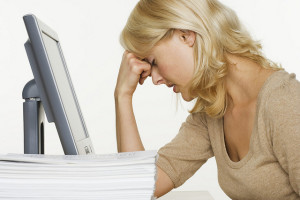
Depression (Image Source)
What is depression? Take the depression quiz Depression and Women Depression and men
What is Depression?
Depression is sadness, angst, grief, and suffering. It is natural to feel depressed when difficult, disappointing, and catastrophic things happen, as they sometimes do in life. For some people, depression is hereditary, in that relatives may have genetically passed on a tendency towards depression. The problem could show up after something difficult happens, or it may occur without a specific triggering event. When you are depressed, you may have problems staying asleep, falling asleep, or sleeping too much. You may find it difficult to concentrate and your memory may be affected. You could feel sluggish or agitated and nervous. You might cry more than usual or find that your emotions are stuck. You may have a tendency to be irritable and snappy. Depression, like many other maladies, comes in different varieties, from mild to moderate, to severe. In more serious instances, you might have suicidal thoughts or the desire to harm yourself. In such situations it is important to get professional help and not to wait for it to get better by itself. There is no reason to suffer alone. This brings up another feature of depression which is the desire to isolate. Sometimes it is helpful to have time alone, but if you are finding yourself staying away from and avoiding people it can be a sign that something is wrong. When you are depressed it is sometimes so painful that you may turn to drugs, alcohol, food, shopping, gambling, etc. to try to numb the pain. The problem is that although these activities may help you in the moment, they are ultimately going to have negative consequences that will drag you further down. You may have heard about depression being anger turned against the self. Anger is a hard emotion to express, especially for women. If you blame yourself for things that are not your fault or your responsibility, you may also put yourself n a negative spiral that starts with feeling badly about yourself, continues with an unhealthy activity such as drinking or spending money you don’t have, and culminates in more self-hatred. Then the cycle repeats itself. This can also happen with food.
Take The Depression Quiz
1. Do you feel sad, anxious, or empty much of the time?
2. Have you lost interest or pleasure in activities, including sex?
3. Are you crying more or having feelings that are heightened or intense such as anxiety and irritability?
4. Do you feel guilty, hopeless, pessimistic, worthless?
5. Do you have difficulty concentrating, feel tired, list-less?
6. Do you sleep more, or have difficulty falling asleep or staying asleep?
7. Have you been thinking about death or suicide?
8. Do you have physical symptoms that don’t respond to treatment such as head- aches, stomach aches, or other pain?
9. Have you recently had a baby?
10. Do you find that you feel worse in the winter?
11. Is there a history of depression in your family?
The more yes answers, the more important it is to get professional help. “Yes” to number 7, please seek help either from your doctor or a therapist right away.
Depression and Women
In her book, Silencing the Self, Women and Depression, author Dana Crowley Jack sees depression in women as loss of the self. This could look like losing your voice in a relationship, trying to be what the other person wants, fear of being wrong, experiencing being discounted, putting everyone else first, worrying about what others think, and the pressure to be traditional. As women we are taught to take care of others, put men first, do what men want, look good, be thin, be more dependent than independent, stay young, be sexy even when we don’t feel like it and of course be great mothers! We are not expected be be lesbians and if gay, face homophobia and potentially, hatred. Ellen McGrath, Ph.D., in her book, When Feeling Bad is Good, looks at six categories of depression that women are more likely to experience: victimization depression, relationship depression, age rage depression,body image depression, and mind/body depression. Some mind/body issues are: * Abortion * Hysterectomy * Infertility * PMS * Pregnancy * Postpartum Depression * Dieting * Breast Cancer * Seasonal Affective Disorder Women and Trauma/ Women Abused as Children Trauma is an experience that is shocking, terrifying, outside of the ordinary, and would produce fear, terror, and helplessness in almost anyone. A few examples of a trauma are being threatened by death or body injury, (such as rape),witnessing someone else being harmed in a violent way, sudden destruction or violence to property. Trauma can include difficult things that happen repeatedly, such as emotional abuse that is experienced over time. Unfortunately, many women experience trauma in childhood, including sexual, physical, and emotional abuse. If you are traumatized, you may be very sensitive, emotional, you may relive traumatic events in your mind or have a tendency to dissociate (check out emotionally) in certain stressful situations. Depression is common for trauma survivors, as well as use of drugs or drinking to numb the pain. You may find yourself in unhappy or abusive situations that create feelings of victimization and powerlessness even when you had no intention of being in that situation.
Getting Help
Depression is not a weakness or a personal failure. It is important not to blame yourself for what you are feeling. Taking action can be very helpful, so reading this is an important beginning step. Start with small steps that can lead you towards recovery. Get information, through the internet, books, or by calling or visiting your doctor. Reach out to friends, family, if available and supportive, and clergy. Or, consider getting counseling. For some people, counseling alone can be very effective, for others counseling and medication are the best approach. In therapy, you will get a chance to tell your story and to be heard with respect and patience. You will have the opportunity to understand more about your reactions to events in your life and get information about how to cope with thoughts, feelings, and emotions. For example, if you are suppressing anger, you can learn new ways of expressing anger that are not harmful to yourself or anyone else. In therapy, you get to be yourself and be accepted for who you are. This can be very helpful for women, since as a woman, you may be used to accepting other people’s perspective on how you are supposed to look, act, and be in the world. You may not be sure who you are or what you believe in, and that can be depressing in and of itself. Even if you are feeling despair and hopelessness, you deserve to take the journey that can lead you to your own inner wellspring of laughter and tears. This journey will lead you to your authentic and wise self which is there waiting for you.

Depression (Image Source)
Depression and Men
Note: The comments here are not solely limited to men, but more the male tendency. As with any generalizations, there are always exceptions and some women may exhibit very similar depression characteristics as described here.
Men may exhibit depression very differently from women, sometimes with anger/hostility and controlling behavior, and sometimes throwing themselves into work or sports as a way to try to avoid or hide the feelings. Men are more likely to try suicide than women, and this may be because many men are less likely to seek treatment and may not get the help that could be life-saving. Men may also be more likely to turn to alcohol and drugs than women who are depressed. Also, men tend to engage in risky behaviors such as reckless driving or extra-marital sex as a result of depression.
Men have a hard time expressing themselves when it comes to emotions, and may be reluctant to discuss depressive symptoms. Men may also be more resistant to getting mental health assistance or going to the doctor for medical check-ups.
Recommendations for men in coping with depression:
Get a physical exam to rule out medical causes for your mood.
Talk to a friend of family member who is supportive.
Consult with a spiritual advisor.
Call a suicide prevention line or 911 if you are imminently suicidal. Remember that most people who live through suicide attempts regret making the attempt.
Make an appointment for therapy and go to the appointment.
Developing healthy coping skills is the way out of depression. These include: setting realistic priorities and goals, seeking out support when you need it, engaging in healthy activities that you enjoy such as exercise, attending sports events, movies, or hobbies, and delaying important decisions until you are feeling less depressed.
Depression is not a weakness or a personal failure. And getting help can enhance your self esteem.
